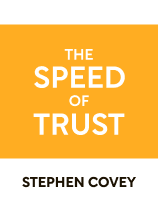

This article is an excerpt from the Shortform book guide to "The Speed of Trust" by Stephen M. R. Covey. Shortform has the world's best summaries and analyses of books you should be reading.
Like this article? Sign up for a free trial here .
How can you show that you are trustworthy? What behavior should you avoid if you want to be trusted? How does building trust improve new and existing relationships?
The Speed of Trust by Stephen Covey explains why building and maintaining trust is important across all relationships, including those in your professional and personal life. Covey identified certain behaviors you can demonstrate to others to show that you are a trustworthy person.
Keep reading if you want to learn how to be trusted by others, according to Covey’s advice.
Behaviors to Avoid When Building Trust
In this article, we’ll review Covey’s advice on applying trustworthy characteristics to your behavior. While learning how to be trusted by others, you should strive for an authentic communication style. Covey explains that people should come away from conversations with you with the right impression of your intentions and motivations. He notes that people are good at spotting inauthentic communication, for example, spinning or telling only parts of the truth. Unfortunately, these tactics waste time, and you pay a hefty trust tax on all future communication when people don’t see you as authentic.
| How to Be Trusted: Avoid Little Fibs The evolutionary drive for self-preservation makes us attuned to inconsistencies between what people say and what they do. To be trusted, how often you tell little fibs matters, and telling little fibs frequently will greatly diminish trust. When people don’t mean what they say or don’t do what they say they will, we learn to trust what they say less. Over time, even seemingly inconsequential fibs, inconsistencies, or omissions can diminish trust. For example, say you tell your friend you’ll pick her up at 8:00 but don’t show up until 8:20. If this happens once, your friend might simply be more attuned to your timing the next time. If it happens repeatedly, your friend will likely start mentally adding 20 minutes to any meet-up time you set because she doesn’t trust that you will be there when you say you will. If this causes strain in your relationship, your small timing inconsistencies could result in a significant trust tax. |
Covey notes that knowing how to be trusted includes being willing to address taboo or unpleasant topics with open and authentic communication. Additionally, since emotionally charged or uncomfortable situations can negatively impact interpersonal interactions and productivity, addressing them within your family or organization can result in major trust dividends.
(Shortform note: Part of maintaining an authentic communication style involves leaving space for emotion in emotional conversations. Conversations about difficult or emotional issues are likely to make participants emotional. But stifling or ignoring these emotions for the sake of objectivity makes these conversations less authentic and potentially less productive.)
When learning how to be trusted, it’s important not to forget that transparency is another way organizations and individuals can show authenticity. For example, a company could lay out its pay structure and promotion track to give its employees a clear sense of what they can expect from their careers. Covey explains that the more details you share, the more you reduce unknowns, and the easier it becomes to trust you.
(Shortform note: Other experts add that transparency can be a great way to build trust when you aren’t sure where else to start. Transparency projects openness and honesty and can make you seem more approachable. For leaders, transparency is a great way to earn respect, start building trust, and create an open and team-oriented culture in an organization. As Covey notes, simply being transparent about wanting to build trust in an organization can be a great way for a new leader to begin building relationships.)
To Be Trusted, Treat People Well
To be trusted, how you treat people matters. According to Covey, treating people well takes consideration and humility. We’ll briefly look at each.
Consideration: To be trusted, how often you consider others makes a difference. People may question your motives and nature if you only show consideration when you feel you have something to gain.
One way to be considerate is to be an active listener. Covey explains that actively listening to other people before adding your own opinions is one of the best ways to build trust.
Humility: The way you handle failure communicates humility and impacts people’s trust in you. People are more likely to trust someone who is open about their mistakes. Covey explains that making a mistake and making excuses or trying to blame someone else for it depletes trust twice: first when people doubt your proficiency and then when they question your nature. Likewise, for people to be at their most innovative and productive, they need to feel comfortable enough to take risks and make their own mistakes.
You also show loyalty and build trust by giving credit where credit is due, celebrating other people’s attributes and achievements, and never taking credit for someone else’s work.
(Shortform note: Data from nearly 4,000 leaders showed that leaders who gave credit to others were rated in the 85th percentile for effective leadership (meaning they were some of the most effective leaders). In contrast, those who took credit from others were rated in the 13th percentile (meaning they were some of the least effective leaders). These results suggest that while it may be difficult to give credit to others rather than taking it for ourselves, we reap large trust dividends when we do.)
| Active Listening Is Easier Said Than Done Being an active listener requires effort and can be harder than it seems. Often, when people are talking to you, you end up focusing more on your own thoughts than on what they’re saying. For example, if someone makes a statement you don’t agree with, you may stop focusing on what they’re saying and start thinking about your rebuttal. One way to improve your listening skills is to create a mental image of what the other person is saying. This exercise keeps your mind on them rather than on your thoughts and helps you process their argument. Another way to improve listening skills is to end conversations with a statement summarizing the important information exchanged during it. Crafting a summary statement forces you to revisit the important points of the discussion, and putting ideas in your own words is an effective way to learn and retain information. |

———End of Preview———
Like what you just read? Read the rest of the world's best book summary and analysis of Stephen M. R. Covey's "The Speed of Trust" at Shortform .
Here's what you'll find in our full The Speed of Trust summary :
- Why trust is the ultimate key to success
- A roadmap for building and leveraging trust
- An explanation of Steven Covey's “four cores of credibility”






